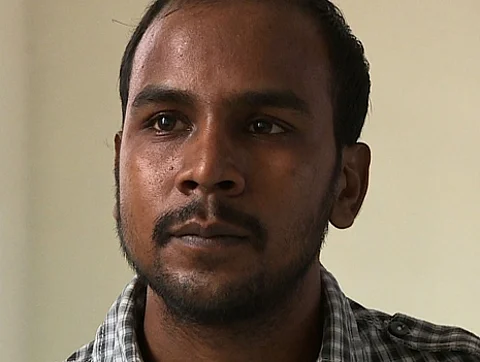

By Deepthy Menon
The News Minute| March 5, 2015|
I watched the documentary India’s Daughter. And I felt not a twinge of remorse or a shred of sympathy for any of the rapists. My takeaways from it were – On the positive side, a still grieving father– a man from a conservative family but a liberal at heart, proud of his daughter and the opportunities he gave her – why doesn't India see themselves in him? Then perhaps we’d have reasons to be proud of ourselves.
I am also angry and repulsed that the lawyers of the rapists are not behind bars with their clients for their abrasive, virulent statements. I watched their quotes a second time to transcribe them ( who knows if the documentary can be repeatedly viewed due to the ban)
“She should not be put on the street like a food. The lady/woman/girl are more precious than a gem or than a diamond. It is upto you how you want to keep that gem or a diamond in your hand. If you put your diamond on the street, certainly the dog will take it out. You can’t stop it.
“We have the best culture. In our culture, there is no place for a woman. “
- ML Sharma, Defence Lawyer
“If my daughter or sister engaged in pre-marital activities, and disgraced herself and allowed herself to lose face and character by doing such things, I would most certainly take this sort of sister or daughter to my farmhouse, and in front of my entire family, I would put petrol on her and set her alight. ( statement given after the rape verdict) This is my stand. I still today stand by that reply. ( statement reiterated at the time of the documentary shoot)”
– AP Singh, Defence Lawyer
How many men do you know in your personal circles who think like this? Not one? I’d doubt if any woman across the length and breadth of India can truthfully say that.
For those who are unlikely to get a chance to watch it or choose not to, here is a short synopsis – It’s a 59 minute documentary, with barely any voiceover or editorialisation. Jyoti’s story and trauma that led to her death is pieced together through interviews with her parents, her tutor. I found no basis for the fear that this documentary is out to malign and cheapen India, its men or paint an untrue picture of our society.
Since writing a piece for The News Minute on why this documentary must be watched, I have received several concerns from people I know and strangers alike – Why should we not ban the documentary? It glorifies the rapists. Why should we give them a platform to speak? Why should we sully the memory of Nirbhaya by hearing the rapist’s version? Why doesn’t BBC make a story of the stories of shame in their countries rather than paint India as a country of rapists, not safe for women? It is stereotyping Indian men as violent and rapists. Here are my answers.
I wanted to hear the version of the rapists and their lawyers – shorn of what the print, broadcast and website media have told me with their screaming headlines and teaser boxes. I did and I still don’t feel a sense of sympathy or regret for them. There was little in what they said that I didn’t know already. The versions of their families, a broken wife of one with a toddler wondering how she can live without her ‘protector’ husband (what he did while in the big bad city is not the wife’s domain and she stays true to her role), the anguish of Jyoti Singh’s parents (we should start calling her that now, shouldn’t we? Her parents are proud that she be known by her name, why do we have to give her a pseudonym?)
Banning this documentary means you will not hear the rabid virulence in the comments and thoughts of the men defending the rapists. To me, action needs to be taken against them too – preventive action so that the women in their families can breathe the air of freedom many of us enjoy. The rapists came from backgrounds that internalised violence as the lot of women, from abject poverty where violent men are seen as brave, powerful men. (These words are no justification of what they did). But I’m more appalled at qualified practising lawyers whose mindset and thinking has been laid bare by this documentary.
I find our politicians’ objections to the airing of this documentary most laughable – It brings down the prestige of India, they say. What acknowledgement or approval do you want from the world, when the women of your country are telling you that they don’t feel safe?
If men feel they are being stereotyped by the conversations and dialogues that this documentary has generated, that is not entirely right. There is a grieving father too in this documentary – a man who championed his daughter’s right to be an individual in her own right, who still fights for justice for her –You may see yourself in him.
The documentary opened up a throb, a regret that in our daily lives, we have changed little. The bigger issues around safety, security and patriarchal mindsets have not changed. I watched it, I don’t regret it. I’d rather more people watched it. It will begin conversations, it will instill an urge to be different from the rapists and the lawyers, who only generate disgust and loathing. It just shows a mirror to how grotesque we are. Swallow it. It is about time we did.

Read Deepthy's earlier piece- Why does airing the Nirbhaya Documentary offend you?